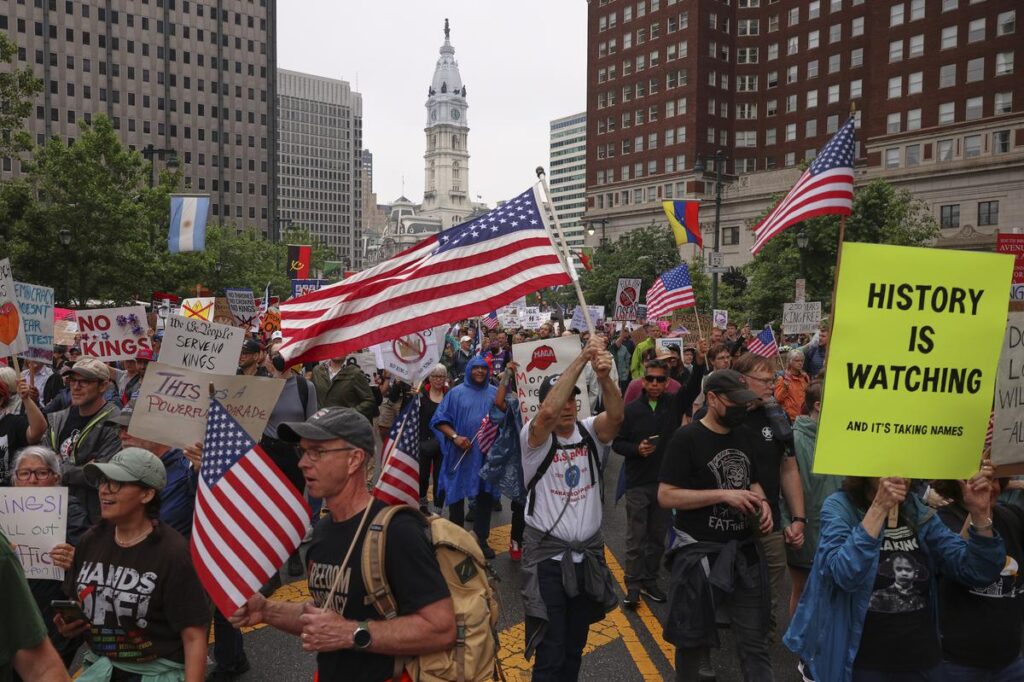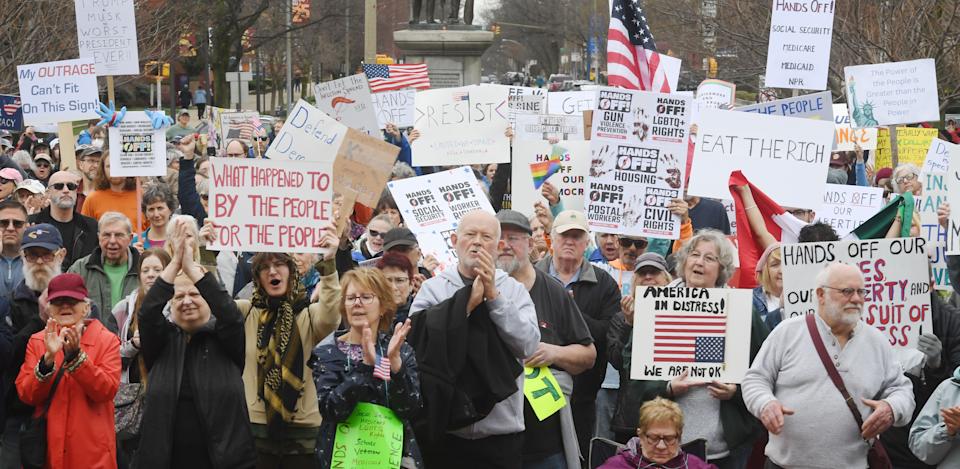On Saturday, June 14, the streets of America pulsed with defiant energy. As President Donald Trump marked his 79th birthday with a controversial military parade in Washington D.C., thousands of citizens across the country gathered to protest what they described as a slow but dangerous erosion of American democratic norms. The event, dubbed “No Kings Day,” brought out a sweeping coalition of activists, everyday citizens, and prominent Hollywood figures, all of whom carried a unified message: America was built on the rejection of monarchy — and it must not fall into one now.
Timed to coincide with Flag Day, the 250th anniversary of the U.S. Army, and Trump’s birthday, the protests served as both symbolic and substantive rebuttals to what critics view as authoritarian leanings in Trump’s leadership style. From New York to Los Angeles, Bozeman to Chicago, participants gathered under a banner of resistance, humor, patriotism, and collective hope for the future of the nation.
“No Kings Day” is more than a clever play on words — it’s a deliberate nod to the foundational ethos of the United States. The country was born from a revolution against monarchy. In rejecting the rule of King George III, the founders forged a republic based on liberty, law, and the voice of the people. Organizers of Saturday’s protest chose the date specifically to underscore what they see as a betrayal of those values under Trump’s leadership.
At the heart of their concern is not just policy differences — although those are plentiful — but what they see as an increasing normalization of authoritarian tactics: contempt for the judiciary, attempts to undermine the press, the politicization of the military, and a cult of personality that undermines institutional checks and balances.
In New York City, a key hub for the day’s events, actor and activist Mark Ruffalo addressed a crowd gathered in Union Square with the fervor of someone who has long used his platform for progressive causes. Known for playing The Hulk in the Avengers franchise, Ruffalo tapped into his on-screen identity to deliver a powerful call to action.
“The Trump administration is trampling on our rights and our laws and our freedoms,” he declared. “We’re gonna have to be brave if we want to be free.”
Ruffalo, flanked by comedians Ilana Glazer and Abbi Jacobson of Broad City, turned to metaphor to drive his point home:
“It’s on us, guys. Literally, together, we’re the Avengers now. No one’s going to come and save us. Americans unite.”
His words were met with raucous applause and chants of “No kings! No kings!” echoing through the crowd, many of whom carried signs comparing Trump to royalty, tyrants, or dictators.

Among the marchers was Susan Sarandon, the Oscar-winning actress known for her unapologetic progressive activism. Sarandon was photographed holding an American flag and walking arm-in-arm with Ruffalo — a show of solidarity that served as a poignant visual of resistance wrapped in patriotism.
The day’s protests weren’t confined to liberal coastal cities. Across the country in Bozeman, Montana, another iconic actress, Glenn Close, was among those who rallied. In an Instagram video, Close said she was “happy to be standing up for the America we know and love,” and added that she was heartened to see people gathering in places not typically associated with high-profile activism.
Meanwhile, in Los Angeles, comedian and late-night host Jimmy Kimmel showed up with his parents, wearing a homemade shirt that read “Make America Good Again.” Kimmel, known for mixing humor with heartfelt political commentary, posted a reflective note on social media:
“I met many people who love this country and still believe it to be a force for good. I know how fortunate I am to have been born into a family that taught me to care about others and that the most important words ever spoken are ‘Love one another.’ It really is as simple as that.”
For many, Kimmel’s words underscored a deeper truth of the protests: this wasn’t just about Trump. It was about what kind of country Americans want to be — and what kind of behavior they’re willing to accept from their leaders.
Actress Julia Louis-Dreyfus, famed for her portrayal of fictional Vice President Selina Meyer in HBO’s Veep, leaned into irony with a protest sign that read: “The only monarch I like is a butterfly.” She posted the photo to Instagram alongside a beaming Kerry Washington, best known for her role in Scandal, a political drama that often seems prophetic.
Washington shared several images and videos from the day, showing her mingling with activists and holding signs that read “Marching, speaking up, and fighting for democracy.”
Their presence signaled more than just celebrity endorsement — it was about using fame as a force multiplier, attracting attention to a movement that organizers hope will reach Americans of all political stripes.
Some celebrities used their wit as a political weapon. Sarah Silverman, never one to shy away from blunt political commentary, held a sign that read: “No Kings Yas Queens.” The cheeky sign captured the spirit of the day — rebellious but hopeful, angry but not bitter.
Rising star Ayo Edebiri, recently acclaimed for her role in The Bear, was photographed holding a sign that said: “Don’t Tread On Us, You Creeps!” The reappropriation of the famous Revolutionary War slogan showed how this new generation of activists is both honoring and reshaping American political language.
While the star power helped draw media attention, the heart of the “No Kings Day” movement was grassroots. In cities and small towns alike, regular citizens showed up with homemade signs, impassioned speeches, and a desire to make their voices heard.

In Chicago, organizers from local community groups staged teach-ins on the Constitution and hosted voter registration drives. In Austin, protestors read aloud sections from the Declaration of Independence and the Bill of Rights. And in Portland, indigenous and Black leaders spoke about the layered history of American freedom — and who has historically been left out of that promise.
Fueling the protests was Trump’s decision to stage a military parade in Washington — a move critics say echoed authoritarian regimes and signaled a dangerous blending of patriotism with personal glorification. Though framed by the White House as a celebration of the U.S. Army’s 250th anniversary, the parade included overt tributes to Trump himself and was widely seen as more campaign spectacle than civic ceremony.
Protesters across the country mocked the parade, with some carrying satirical signs like “Dictators Love a Good Parade” and “We Fought a Revolution to Avoid This.”
Whether the “No Kings Day” protests will have a lasting impact remains to be seen. Organizers and participants alike acknowledged that one day of marching won’t undo years of political division. But for many, the protest wasn’t about changing everything overnight — it was about reaffirming values and drawing a line in the sand.
“It’s about standing up and being counted,” said one protester in Philadelphia. “It’s about reminding each other that we’re not alone, and that this country belongs to all of us — not just one man who wants to be king.”
As the 2024 election cycle continues to unfold, the stakes of events like “No Kings Day” become even clearer. At a time when misinformation spreads rapidly, institutions are under strain, and the public’s trust in government is eroding, moments of visible, peaceful protest carry symbolic weight.
Whether led by A-list celebrities or local teachers, the message is the same: Democracy is not a guarantee. It must be defended — sometimes in the streets, with signs, chants, and courage.
As night fell on June 14, candles were lit at vigils from San Francisco to St. Louis. Protesters sang, chanted, and in some places read poems by Langston Hughes and Walt Whitman. The final message was not one of despair, but of defiance and hope.

“We’re not here because we hate America,” said one speaker in Denver. “We’re here because we love it — enough to fight for it.”










